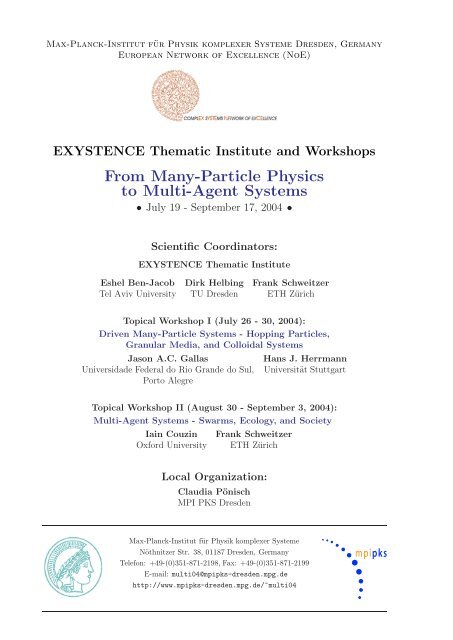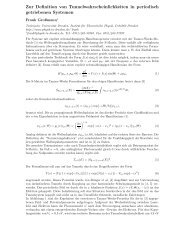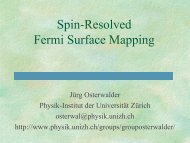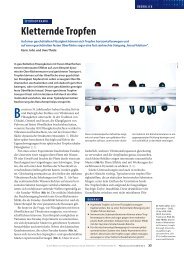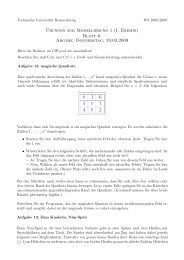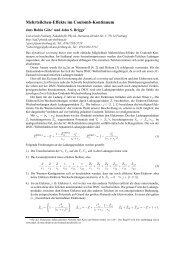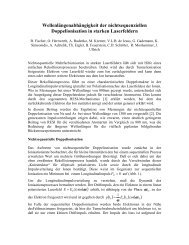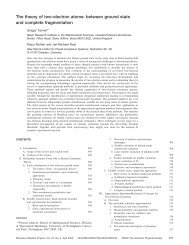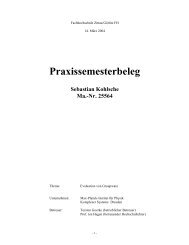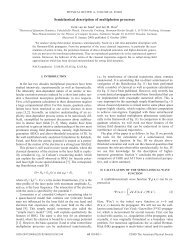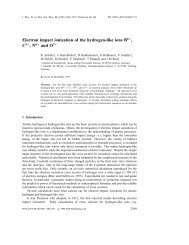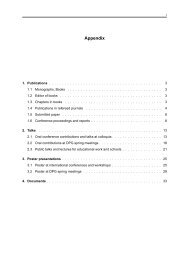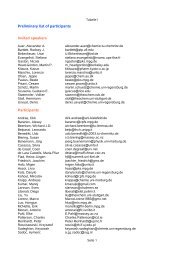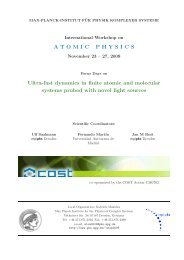From Many-Particle Physics to Multi-Agent Systems
From Many-Particle Physics to Multi-Agent Systems
From Many-Particle Physics to Multi-Agent Systems
You also want an ePaper? Increase the reach of your titles
YUMPU automatically turns print PDFs into web optimized ePapers that Google loves.
Max-Planck-Institut für Physik komplexer Systeme Dresden, Germany<br />
European Network of Excellence (NoE)<br />
EXYSTENCE Thematic Institute and Workshops<br />
<strong>From</strong> <strong>Many</strong>-<strong>Particle</strong> <strong>Physics</strong><br />
<strong>to</strong> <strong>Multi</strong>-<strong>Agent</strong> <strong>Systems</strong><br />
• July 19 - September 17, 2004 •<br />
Scientific Coordina<strong>to</strong>rs:<br />
EXYSTENCE Thematic Institute<br />
Eshel Ben-Jacob Dirk Helbing Frank Schweitzer<br />
Tel Aviv University TU Dresden ETH Zürich<br />
Topical Workshop I (July 26 - 30, 2004):<br />
Driven <strong>Many</strong>-<strong>Particle</strong> <strong>Systems</strong> - Hopping <strong>Particle</strong>s,<br />
Granular Media, and Colloidal <strong>Systems</strong><br />
Jason A.C. Gallas Hans J. Herrmann<br />
Universidade Federal do Rio Grande do Sul, Universität Stuttgart<br />
Por<strong>to</strong> Alegre<br />
Topical Workshop II (August 30 - September 3, 2004):<br />
<strong>Multi</strong>-<strong>Agent</strong> <strong>Systems</strong> - Swarms, Ecology, and Society<br />
Iain Couzin Frank Schweitzer<br />
Oxford University ETH Zürich<br />
Local Organization:<br />
Claudia Pönisch<br />
MPI PKS Dresden<br />
Max-Planck-Institut für Physik komplexer Systeme<br />
Nöthnitzer Str. 38, 01187 Dresden, Germany<br />
Telefon: +49-(0)351-871-2198, Fax: +49-(0)351-871-2199<br />
E-mail: multi04@mpipks-dresden.mpg.de<br />
http://www.mpipks-dresden.mpg.de/~multi04
EXYSTENCE Thematic Institute:<br />
<strong>From</strong> <strong>Many</strong>-<strong>Particle</strong> <strong>Physics</strong> <strong>to</strong> <strong>Multi</strong>-<strong>Agent</strong> <strong>Systems</strong><br />
The Thematic Institute (TI) - <strong>to</strong>gether with the two accompanying Topical Workshops<br />
(TW I / II) - is part of the activities of the European Network of Excellence (NoE)<br />
“Complex <strong>Systems</strong>” (EXYSTENCE). It takes place at the Max-Planck Insitute for the<br />
<strong>Physics</strong> of Complex <strong>Systems</strong> (MPI PKS) in Dresden from Monday, 19 July 2004, <strong>to</strong><br />
Friday, 17 September 2004, and is jointly financed by EXYSTENCE and the MPI PKS.<br />
EXYSTENCE is founded by the European Commission within the Future Emerging<br />
Technologies (FET) Programme of the Information Society Technologies (IST)<br />
Programme of the Fifth Framework (IST-2001-32802) from March 2002 until September<br />
2005. The NoE aims <strong>to</strong> develop collaboration among European researchers interested in<br />
Complex <strong>Systems</strong>, from fundamental concepts <strong>to</strong> applications, and involving academia,<br />
business and industry.<br />
TI/TW of the NoE have <strong>to</strong> focus on issues of Complex <strong>Systems</strong> from a broader<br />
perspective. They should cover transdisciplinary aspects of Complex <strong>Systems</strong>, in order<br />
<strong>to</strong> develop a commonality of concepts and methods applicable <strong>to</strong> different fields.<br />
The TI “<strong>From</strong> <strong>Many</strong>-<strong>Particle</strong> <strong>Physics</strong> <strong>to</strong> <strong>Multi</strong>-<strong>Agent</strong> <strong>Systems</strong>” matches these conditions<br />
in various respects. It aims at a transfer of methods developed primarily in statistical<br />
physics <strong>to</strong> deal with many-particle systems in other scientific areas, such as biology,<br />
artificial intelligence, or social sciences. Certainly, the basic entities in these fields differ<br />
from physical “particles” in that they already have an intermediate complexity<br />
themselves. Therefore, these entities <strong>to</strong>day are commonly denoted as agents. This term<br />
means a subunit of the system that may already have internal degrees of freedom <strong>to</strong><br />
allow certain activities, such as (active) movement, and interaction with other agents.<br />
<strong>Systems</strong> comprised of a (usually large) number of (usually strongly) interacting agents<br />
(entities, components, ...) are denoted as Complex <strong>Systems</strong>, because the system<br />
behavior cannot be simply inferred from the behavior of the components. That is,<br />
self-organization and emergent properties play an important role in determining the<br />
resulting spatio-temporal patterns, or the collective “behavior” on the macroscopic level.<br />
In order <strong>to</strong> gain insight in<strong>to</strong> the interplay between microscopic interactions and<br />
macroscopic features in Complex <strong>Systems</strong>, it is important <strong>to</strong> find a modeling level,<br />
which on one hand considers specific features of the system and is suitable <strong>to</strong> reflect the<br />
origination of new qualities, but on the other hand is not flooded with microscopic<br />
details. In this respect microscopic, i.e. particle-based and agent-based models have<br />
become a very promising approach <strong>to</strong> investigate and <strong>to</strong> simulate complex systems. A<br />
commonly accepted theory of multi-agent systems that also allows analytical<br />
investigations is however still pending. It will be a multi-disciplinary challenge <strong>to</strong><br />
improve this situation, in which also statistical physics needs <strong>to</strong> play its part, both by<br />
contributing concepts and formal methods. Its long lasting experience in describing<br />
many-particle systems, <strong>to</strong> deduce the structure, properties and dynamics of matter from<br />
microscopic interaction laws, may serve as a paragon also for other scientific areas,<br />
where one would finally like <strong>to</strong> explain the observed macroscopic dynamics based on<br />
non-linear interactions among a large number of different agents.<br />
The TI/TW want <strong>to</strong> contribute <strong>to</strong> this development, by bringing <strong>to</strong>gether scientists<br />
from different fields who deal with many-particle and multi-agent systems, <strong>to</strong> allow<br />
mutual interaction and new insights - both for physicists who want <strong>to</strong> apply their<br />
methods <strong>to</strong> interdisciplinary problems, and for scientists from other fields interested in<br />
formal methods developed for interacting particle systems.
Topical Workshop II:<br />
<strong>Multi</strong>-<strong>Agent</strong> <strong>Systems</strong> -<br />
Swarms, Ecology, and Society<br />
The workshop primarily focuses on agent-based models of collective interaction in<br />
animated systems. This includes “microscopic” models for collective biological<br />
phenomena, such as aggregation, swarming behavior (global vs. local coupling, energetic<br />
conditions), or complex interaction in insect societies (nest building, trail following,<br />
chemical communication). Another focus will be applications of agent-based models <strong>to</strong><br />
population dynamics, in particular for spatial interactions of populations. This also<br />
involves approaches from evolutionary game theory <strong>to</strong> understand the evolution of<br />
cooperation and the adaptation of strategies <strong>to</strong> a changing environment. Eventually,<br />
agent-based models in the social science shall play a considerable role, in order <strong>to</strong><br />
explain phenomena such as the coordination of decisions via information exchange,<br />
collective opinion formation, or the establishment of (social) networks among agents.<br />
The workshop shall further discuss the striking analogies in the collective behavior of<br />
biological or socio-economic systems and driven many-particle systems (see workshop I),<br />
that are observed on a phenomenological level. This includes phenomena such as<br />
self-organized criticality, fluctuation-induced ordering phenomena (e.g. agglomeration or<br />
segregation), non-equilibrium phase transitions and spontaneous structure formation. It<br />
should, therefore, be explored in which respects and <strong>to</strong> what extent conclusions from<br />
driven many-particle systems are relevant for the functionality, stability, reliability, and<br />
efficiency of biological and ecological systems, of societies, organizations,<br />
administrations, companies, production processes, etc.
Program 1<br />
1 Abstracts available at http://www.mpipks-dresden.mpg.de/˜multi04/
Sun, 29 Aug 18:00 Registration<br />
Program 1<br />
19:00 Welcome buffet<br />
Mon, 30 Aug 08:45 - 09:00 Frank Schweitzer/Jan-Michael Rost<br />
Opening<br />
09:00 - 09:45 Dan Rubenstein<br />
The dynamics of multi-agent systems in space and time:<br />
Comparing idealized with real animals<br />
09:45 - 10:30 Kai Nagel<br />
Large scale multi-agent traffic simulations<br />
10:30 - 11:00 Coffee break<br />
11:00 - 11:30 Rui Carvalho<br />
<strong>Agent</strong>-based modelling of urban change:<br />
<strong>From</strong> regional <strong>to</strong> small scale events<br />
11:30 - 12:00 Nadav Shnerb<br />
Threshold, noise and adaptation in multi agent reactive systems<br />
12:00 - 12:30 Gyorgy Szabo<br />
Competing associations in spatial preda<strong>to</strong>r-prey models<br />
12:30 - 14:30 Lunch<br />
14:30 - 15:00 David Sumpter<br />
<strong>Multi</strong>-agent decision making: Lessons from the ants<br />
15:00 - 16:00 TUTORIAL: Sven Brückner<br />
Implementing swarming in real-world applications<br />
16:00 - 16:30 Coffee break<br />
16:30 - 17:30 Poster session<br />
Hoi-Yeung Chan<br />
Dynamical transitions in agent-based models of competing population<br />
Niloy Ganguly<br />
A biology-inspired multi-agent system for<br />
efficient search of unstructured networks<br />
Petr Hedbavny<br />
A viable pension reform: The importance of mechanisms<br />
which promote listening <strong>to</strong> each other<br />
1 Abstracts available at http://www.mpipks-dresden.mpg.de/˜multi04/
Program 1<br />
Mon, Aug 30 Fernando Peruani<br />
Mimicking swarming of Myxobacteria: Collective behavior<br />
of active Brownian particles with rod-shape<br />
18:30 Dinner<br />
Diemo Urbig<br />
Opinion dynamics and innovation diffusion<br />
Harold de Vladar<br />
Tumor growth velocities inferred from survival analysis:<br />
Linking microscopic tumor dynamics <strong>to</strong> cancer prognosis<br />
Jürgen Vollmer<br />
Vortex formation in Daphnia swarms<br />
Jamie Wood<br />
One-dimensional flocks revisited: Results from<br />
the O’Loan and Evans model<br />
Tue, Aug 31 09:00 - 09:45 Jean-Louis Deneubourg<br />
Communal decision-making and patterns of aggregation<br />
09:45 - 10:30 Steve Simpson<br />
Swarming in locusts: <strong>From</strong> neurones <strong>to</strong> populations<br />
10:30 Group pho<strong>to</strong><br />
10:30 - 11:00 Coffee break<br />
11:00 - 11:30 Jens Krause<br />
Social networks in group-living animals<br />
11:30 - 12:00 Hugues Chaté<br />
Moving and staying <strong>to</strong>gether without a leader:<br />
Minimal ingredients for collective and cohesive motion<br />
12:00 - 12:30 Charlotte Hemelrijk<br />
Despotism, boldness and female dominance: A model<br />
12:30 - 14:30 Lunch<br />
14:30 - 16:00 WORKING GROUPS<br />
<strong>Multi</strong>-agent systems and collective motion<br />
(leadbyIainCouzin&DavidSumpter)<br />
<strong>Multi</strong>-agent systems and the social sciences<br />
(lead by Petra Ahrweiler & Charlotte Hemelrijk)<br />
1 Abstracts available at http://www.mpipks-dresden.mpg.de/˜multi04/
Tue, Aug 31 16:00 - 16:30 Coffee break<br />
Program 1<br />
16:30 - 17:30 Working group reports and plenary discussion<br />
18:30 Dinner<br />
Wed, Sep 01 09:00 - 09:45 Eric Bonabeau<br />
Real-world applications of multi-agent simulations<br />
09:45 - 10:30 Dirk Helbing<br />
Interactive decision dynamics: Theories and experiments<br />
10:30 - 11:00 Coffee break<br />
11:00 - 11:30 Stefano Battis<strong>to</strong>n<br />
Networks of social agents and decision making dynamics<br />
in organizations<br />
11:30 - 12:00 Christian Hahn<br />
Improving theory: Building robust organizational forms<br />
for holonic multiagent systems<br />
12:00 - 12:30 Matteo Richiardi<br />
Generalizing Gibrat. Reasonable s<strong>to</strong>chastic multiplicative models<br />
of firm dynamics with entry and exit<br />
12:30 - 14:15 Lunch<br />
14:15 Meeting our <strong>to</strong>ur guides in the institute hall<br />
14:32 Tram <strong>to</strong> the city centre (tickets provided)<br />
15:00 - 16:30 Guided city <strong>to</strong>ur<br />
18:30 Dinner at restaurant Waldschlösschen<br />
1 Abstracts available at http://www.mpipks-dresden.mpg.de/˜multi04/
Program 1<br />
Thu, Sep 02 09:00 - 09:45 Nicole Saam<br />
Simulating intergovernmental negotiations with MAS<br />
09:45 - 10:30 Petra Ahrweiler<br />
Simulating knowledge dynamics in innovation networks using MAS<br />
10:30 - 11:00 Coffee break<br />
11:00 - 11:30 Werner Ebeling<br />
S<strong>to</strong>chastic models of socio-economic processes:<br />
Innovations and transitions <strong>to</strong> new technologies<br />
11:30 - 12:00 Jan Lorenz<br />
Continuous opinion dynamics formulated in matrix language<br />
and its relation <strong>to</strong> swarms<br />
12:00 - 12:30 Akira Namatame<br />
Evolutionary design of desired collective behavior<br />
12:30 - 14:30 Lunch<br />
14:30 - 15:00 Thomas Fent<br />
Social influence on marriage: An agent based model<br />
15:00 - 15:30 Tadeusz Platkowski<br />
Some experimental and numerical results on Minority Game<br />
15:30 - 16:00 Jeremy Bradley<br />
Internet worm attacks and s<strong>to</strong>chastic agent models<br />
16:00 - 16:30 Coffee break<br />
16:30 - 17:30 TUTORIAL: Volker Grimm<br />
<strong>Agent</strong>-based models in ecology and natural resource management<br />
18:30 Dinner<br />
Fri, Sep 03 09:00 - 09:45 Maxi San Miguel<br />
Neighborhood models of minority opinion spreading<br />
09:45 - 10:30 Sven Brückner<br />
The swarm in the box - Systematic simulations for the evaluation<br />
of engineered swarming systems<br />
10:30 - 11:00 Coffee break<br />
1 Abstracts available at http://www.mpipks-dresden.mpg.de/˜multi04/
Program 1<br />
Fri, Sep 03 11:00 - 11:30 Uli Harder<br />
An agent-based model for price dynamics in a GRID market<br />
11:30 - 12:00 Salima Hassas<br />
Managing dynamic flows in production chains through self-organization<br />
12:30 - 14:30 Lunch<br />
1 Abstracts available at http://www.mpipks-dresden.mpg.de/˜multi04/
Participants<br />
Petra Ahrweiler Universität Hamburg<br />
ahrweiler@sozialwiss.uni-hamburg.de Hamburg, Germany<br />
Dieter Armbruster Arizona State University<br />
armbruster@asu.edu Tempe, USA<br />
Stefano Battis<strong>to</strong>n Ecole Normale Supérieure<br />
battis<strong>to</strong>n@ens.fr Paris, France<br />
Eshel Ben-Jacob Tel Aviv University<br />
eshel@tamar.tau.ac.il Tel Aviv, Israel<br />
Chris<strong>to</strong>pher Blaufelder Cambridge University<br />
ccmb2@cam.ac.uk Cambridge, UK<br />
Eric Bonabeau Icosystem Corporation<br />
eric@icosystem.net Cambridge, USA<br />
Jeremy Bradley Imperial College London<br />
jb@doc.ic.ac.uk London, UK<br />
Sven Brückner Altarum Institute<br />
sven.brueckner@altarum.org Ann Arbor, USA<br />
Kathleen Carley Carnegie Mellon University<br />
kathleen.carley@cmu.edu Pittsburgh, USA<br />
Rui Carvalho University College London<br />
rui.carvalho@ucl.ac.uk London, UK<br />
Anirban Chakraborti Brookhaven National Labora<strong>to</strong>ry<br />
anirban@bnl.gov Up<strong>to</strong>n, USA<br />
Hoi-Yeung Chan The Chinese University of Hong Kong<br />
hychan@phy.cuhk.edu.hk Hong Kong, China<br />
Hugues Chaté CEA Saclay<br />
chate@drecam.saclay.cea.fr Gif-sur-Yvette, France<br />
Iain Couzin University of Oxford<br />
iain.couzin@zoology.oxford.ac.uk Oxford, UK<br />
Deffuant, Guillaume CEMAGREF<br />
guillaume.deffuant@cemagref.fr Aubière, France<br />
Jean-Louis Deneubourg Université Libre de Bruxelles<br />
jldeneub@ulb.ac.be Bruxelles, Belgium<br />
Sergey Denysov MPI PKS<br />
denysov@mpipks-dresden.mpg.de Dresden, Germany
Participants<br />
Werner Ebeling Humboldt-Universität zu Berlin<br />
ebeling@physik.hu-berlin.de Berlin, Germany<br />
Thomas Fent Vienna Institute of Demography<br />
Thomas.Fent@oeaw.ac.at Vienna, Austria<br />
Guido Fioretti University of Bologna<br />
fioretti@cs.unibo.it Bologna, Italy<br />
Maarten Franssen Delft University of Technology<br />
m.p.m.franssen@tbm.tudelft.nl Delft, The Netherlands<br />
Niloy Ganguly TU Dresden<br />
niloy@zhr.tu-dresden.de Dresden, Germany<br />
Volker Grimm Center for Environmental Research Leipzig-Halle<br />
volker.grimm@ufz.de Leipzig, Germany<br />
Christian Hahn German Research Center for Artificial Intelligence<br />
Christian.Hahn@dfki.de Saarbrücken, Germany<br />
Uli Harder Imperial College London<br />
uh@doc.ic.ac.uk London, UK<br />
Torsten Hartmann TU Dresden<br />
nasdaqer@planet-interkom.de Dresden, Germany<br />
Salima Hassas Université Claude Bernard - Lyon I<br />
hassas@liris.cnrs.fr Villeurbanne, France<br />
Petr Hedbavny Charles University of Prague<br />
hedbavny@mbox.fsv.cuni.cz Prague, Czech Republic<br />
Dirk Helbing TU Dresden<br />
helbing1@vwisb7.vkw.tu-dresden.de Dresden, Germany<br />
Charlotte Hemelrijk University of Groningen<br />
c.hemelrijk@biol.rug.nl Haren, The Netherlands<br />
Jens Krause University of Leeds<br />
j.krause@leeds.ac.uk Leeds, UK<br />
Jan Lorenz University of Bremen<br />
math@janlo.de Bremen, Germany<br />
Heinz Mühlenbein Fraunhofer Institut AiS<br />
heinz.muehlenbein@ais.fraunhofer.de Sankt Augustin, Germany<br />
Kai Nagel TU Berlin<br />
multi04@kainagel.org Berlin, Germany
Participants<br />
Akira Namatame National Defense Academy<br />
nama@nda.ac.jp Yokosuka, Japan<br />
Emeterio Navarro Humboldt-Universität zu Berlin<br />
navarro@informatik.hu-berlin.de Berlin, Germany<br />
Fredrik Nilsson Lund University<br />
fredrik.nilsson@plog.lth.se Lund, Sweden<br />
Fernando Peruani MPI PKS<br />
peruani@mpipks-dresden.mpg.de Dresden, Germany<br />
Tadeusz Platkowski Warsaw University<br />
tplatk@mimuw.edu.pl Warsaw, Poland<br />
Matteo Richiardi Labora<strong>to</strong>rio Revelli<br />
m.richiardi@labor-<strong>to</strong>rino.it Moncalieri, Italy<br />
Dan Rubenstein Prince<strong>to</strong>n University<br />
dir@prince<strong>to</strong>n.edu Prince<strong>to</strong>n, USA<br />
Nicole Saam Philipps-Universität Marburg<br />
nicole.saam@soziologie.uni-muenchen.de Marburg, Germany<br />
Maxi San Miguel Universitat Illes Balears<br />
maxi@imedea.uib.es Palma de Mallorca, Spain<br />
Frank Schweitzer ETH Zürich<br />
fschweitzer@ethz.ch Zürich, Switzerland<br />
Nadav Shnerb Bar-Ilan University<br />
shnerbn@mail.biu.ac.il Ramat-Gan, Israel<br />
Stephen Simpson University of Oxford<br />
stephen.simpson@zoology.oxford.ac.uk Oxford, UK<br />
David Sumpter University of Oxford<br />
sumpter@maths.oxford.ac.uk Oxford, UK<br />
Gyorgy Szabo Research Institute for Technical <strong>Physics</strong> and Material Sciences<br />
szabo@mfa.kfki.hu Budapest, Hungary<br />
Ulrike Trommer TU Berlin<br />
trommer@vsp.tu-berlin.de Berlin, Germany<br />
Paola Tubaro Université Paris 10<br />
paola.tubaro@u-paris10.fr Nanterre, France<br />
Diemo Urbig Humboldt-Universität zu Berlin<br />
urbig@informatik.hu-berlin.de Berlin, Germany
Participants<br />
Harold de Vladar Centro de Biociencias<br />
hpvladar@idea.gov.ve Caracas, Venezuela<br />
Jürgen Vollmer Philipps Universität Marburg<br />
juergen.vollmer@physik.uni-marburg.de Marburg, Germany<br />
Jamie Wood University of Oxford<br />
wood@thphys.oxford.ac.uk Oxford, UK
Frequently asked questions<br />
• SEMINAR AND WORKSHOP SECRETARIAT: Office 2 A 7 (second floor)<br />
from Monday <strong>to</strong> Thursday 08:00 - 12:00 and 13:00 - 16:45. On Friday 08:00 - 12:00 and<br />
13:00 - 15:30.<br />
• SCIENTIFIC COORDINATOR’S OFFICE: Iain Couzin office 2 A 9 (tel.: 2109)<br />
and Frank Schweitzer office 1 B 8 (tel.: 1208).<br />
• WORKSHOP II WELCOME: On the evening of August 29, 2004 at 07:00 p.m. a<br />
welcome reception will take place in the hall of the institute as an occasion <strong>to</strong> get <strong>to</strong><br />
know each other while enjoying a buffet. Everybody is invited <strong>to</strong> join! Non-participants<br />
pay 8,50 Euro <strong>to</strong> Mr. Schneider from the cafeteria.<br />
• COMPUTERS: The computers in the offices 2 A 11, 2 A 13, 2 A 14, 2 A 15, 2 A 16,<br />
2 A 18 and 2 A 20 are reserved for the participants. Every participant gets an own<br />
computer account. Your login is the one you specified in your registration/application<br />
form or in case you specified none the first 8 letters of your last name. If your name has<br />
less than 8 letters then just leave the rest unfilled. Please log on <strong>to</strong> the machine “milou”.<br />
The password is mul?TI . Please change your password as soon as you have logged<br />
in. The command is passwd. After changing your password it is also possible <strong>to</strong> work<br />
on the machines “janus” and “titania”.<br />
The computer account will be deleted two months after September 17, 2004.<br />
Please get in contact with Hubert Scherrer-Paulus (2 A 6) for keeping your<br />
account longer than November 17, 2004.<br />
Information on the institute’s computer system is available through:<br />
http://www.mpipks-dresden.mpg.de/closed/getting started/getting started.html<br />
If you have any questions please contact Thomas Müller (2 A 4) or Torsten Goerke<br />
(2 A 12) in computer-related questions. Help with hardware (terminals, printers) can be<br />
obtained from Helmut Deggelmann (2 A 10).<br />
• PRINTERS: A list of all available printers in the institute can be found under:<br />
http://www.mpipks-dresden.mpg.de/closed/getting started/Available printers.html<br />
• LIBRARY: Our library is a reference library, which means that books must remain in<br />
the institute. You are allowed <strong>to</strong> check out books and use them in your office. Please ask<br />
Mrs. Näther, our librarian, for details. Journals should not be taken out of the library.<br />
Articles, which are not available in our library may be requested from other libraries in<br />
Germany. Information concerning the library is available at<br />
http://www.mpipks-dresden.mpg.de/library/library.html, including an on-line catalogue.<br />
• COPY MACHINES: You can use the copy machines in 1 C 11 and 2 C 11.<br />
• OFFICE SUPPLIES: Paper and everyday office materials are available in room<br />
1 C 11. To request further material please contact Mrs. Dohrmann at the institute’s<br />
reception desk.<br />
• HEALTH INSURANCE: If you do not have a health insurance which is valid for<br />
Germany please come <strong>to</strong> the workshop secretariat in order <strong>to</strong> arrange one.<br />
• SOCIAL PROGRAM: Please check the conference board in the hall and the webpage<br />
for details.<br />
• TELEPHONE CALLS: For private calls you can buy a telephone card at the<br />
institute’s reception desk. It costs 10 Euro. You can also use the coin phone in the<br />
entrance hall of the institute. For business calls please come <strong>to</strong> office 2 A 7.
Frequently asked questions<br />
• FAX: A fax machine is available on the ground floor at the institute’s reception desk.<br />
• MAIL: Internal and external outgoing mail can be left at the reception desk at the<br />
entrance. Stamps are also available there upon request.<br />
• PRIVATE CAR: You need a special permit <strong>to</strong> park your car at the institute’s parking<br />
lots, please contact Mrs. Dohrmann at the institutes reception desk in order <strong>to</strong> get the<br />
permit.<br />
• SHOPPING: Throughout Germany shops are open Monday <strong>to</strong> Friday from 09:00 <strong>to</strong><br />
18:00 (in the city centre until 20:00 or even 22:00) and Saturday from 09:00 <strong>to</strong> 20:00<br />
– The main shopping centre “Prager Strasse” is close <strong>to</strong> the Main Railway Station.<br />
Take tram no. 3 <strong>to</strong> the s<strong>to</strong>p “Walpurgisstrasse” and keep <strong>to</strong> the left. You will find<br />
a large department s<strong>to</strong>re (Karstadt) as well as many other shops on “Prager<br />
Strasse”. If you walk in direction of the “Altmarkt” you will find another shopping<br />
mall called “Altmarktgalerie” with more than 100 shops.<br />
– Food and beverages: within 5 minutes walk along the tram tracks <strong>to</strong>wards the city<br />
centre you will find a bakery and a butcher on the right hand side of the street (on<br />
Landsberger Strasse). A few more minutes in the same direction, but on the left<br />
hand side, you will find a small supermarket (Konsum) and a shop selling fresh<br />
fruits and vegetables, as well as beverages. Every Wednesday and Saturday there is<br />
a small market at Münchner Platz from the morning until early afternoon.<br />
• FOR THOSE ACCOMMODATED IN THE MPI GUEST HOUSES:<br />
– Breakfast: is served weekdays from 08:00 a.m. onward at the cafeteria. On<br />
weekends there is the possibility <strong>to</strong> have breakfast in the nearby bakery on<br />
Münchner Platz - Bäckerei Möbius. They serve breakfast on Saturdays from 6 a.m.<br />
onward. On Sundays they are open only from 1:30 p.m. onward.<br />
The student’s pub “B’Liebig” on Liebigstr. 24 is offering a breakfast buffet (cost:<br />
7,00 Euro) on Sundays from 9 a.m.<br />
– Guest house keys: you can open each entrance of the institute as well as the library<br />
with your guest house key. Within the blue part of the key is a chip: move it along<br />
the little box at each entrance, after a beep you can open the door.<br />
On your departure day please drop the guest house keys in<strong>to</strong> the box in<br />
the entrance hall of your guest house. Please vacate the guest house<br />
before 9a.m.<br />
• FOR THOSE ACCOMMODATED IN THE HOTEL OR B&B KÄUBLER:<br />
– Breakfast: is served in the hotel or B&B.<br />
– Keys for entering the institute: please come <strong>to</strong> room 2 A 7 in order <strong>to</strong> get one.<br />
Please do not forget <strong>to</strong> give it back when leaving.<br />
• LAUNDRY: There is the possibility <strong>to</strong> wash your clothes in the basement of guest<br />
house no. 2. Please dry your clothes there and not in your room!<br />
• SECURITY: After 6:30 p.m. the entrances of the institute should be locked. Please<br />
check after entering or leaving the institute that the door is correctly shut. Please leave<br />
your window shut or tilted, but not open.<br />
YOUR SUGGESTIONS AND QUESTIONS ARE ALWAYS WELCOME!
Notes
Notes
Notes
Notes
printed: 1st Oc<strong>to</strong>ber 2004


